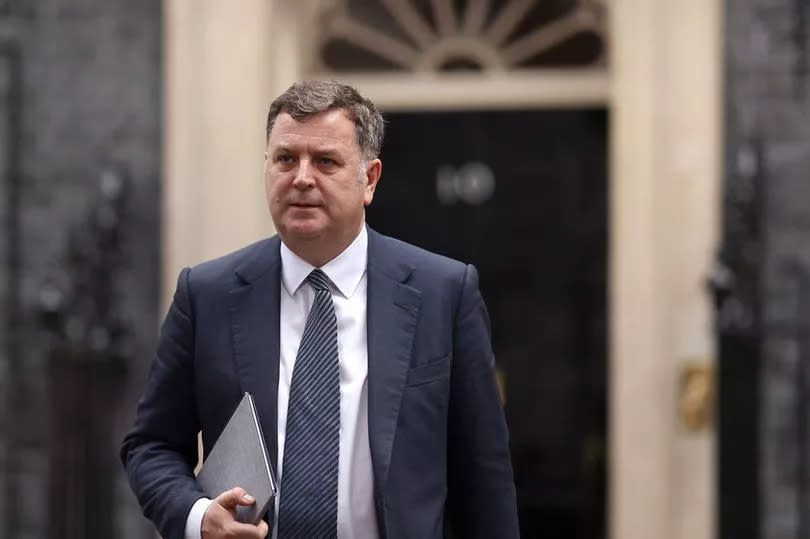DWP announces 2,500-strong team for bank account and home raids benefits crackdown

The Department for Work and Pensions (DWP) has unveiled plans for a team of 2,500 officers to check Universal Credit claims, with measures that could include checking bank accounts for signs of fraud. The DWP has reported savings of £1.3 billion from fraud and error prevention over the past year as part of a crackdown.
Anti-fraud initiatives in the last year have led to the dismantling of a colossal £53.9 million Universal Credit fraud, labelled the largest benefit fraud in UK history. The latest announcement from the DWP set a target to save £9 billion over the next four years.
The DWP is in the process of hiring 2,500 investigators tasked with verifying the accuracy of millions of Universal Credit claims. The Data Protection and Digital Information Bill, currently making its way through Parliament, will help the Department's ability to work alongside third parties, such as banks, to identify claims that may indicate fraud or errors. The legislation will also empower DWP officials to carry out home raids and make arrests.
Read next: DWP brings in strict new '18 hour' rule for Universal Credit claimants
Read next: DWP to pay up to £434 per month to people living with these 25 conditions
This will see the DWP working with banks to check the accounts of individuals suspected of fraud, checking for excessive savings and monitoring their transactions. A new civil penalty will be introduced to penalise those who commit fraud, with an investment of £70 million earmarked for advanced data analytics, reports Nottinghamshire Live.
The DWP said: "These measures will mean those who wish to exploit the natural compassion and generosity of the British people will have nowhere to hide."
'We are scaling up the fight against those stealing from the taxpayer'
The new bill, which allows banks to provide data to investigators, is expected to recover an additional £600 million. This follows the Prime Minister's announcement of major welfare system reforms last month, including a forthcoming bill aimed at confronting benefit fraud directly.
The DWP plans to introduce legislation that will align its investigative powers with those of HMRC for tax purposes, enabling actions such as making arrests and carrying out searches and seizures under warrant. The department also aims to update its information-gathering capabilities to expedite the process of proving or disproving fraud.
Mel Stride, Secretary of State for Work and Pensions, said: "We are scaling up the fight against those stealing from the taxpayer, building on our success in stopping £18 billion going into the wrong hands in 2022-23. With new legal powers, better data and thousands of additional staff, our comprehensive plan ensures we have the necessary tools to tackle the scourge of benefit fraud."
The DWP is recruiting more than 2,500 external agents temporarily for the Targeted Case Review, which aims to detect inaccuracies in Universal Credit claims. When combined with the DWP's internal team, the total number of personnel involved in the review will approach 6,000.
The DWP is also considering a new civil penalty to penalise fraudsters, potentially expanding the range of cases that can receive a penalty when the courts are not prosecuting, and increasing the value of the civil penalty. In addition, changes will be made to Universal Credit including partially automated checks on self-employed income, new online prompts for claimants to re-declare their circumstances (such as if they have moved in with a partner), and increased checks on capital when people claim the benefit to ensure eligibility.
These measures will be supported by advanced data analytics, utilising machine learning, to identify and prevent fraudulent claims. Final decisions on accepting or rejecting any claim will continue to be made by a DWP staff member.
Earnings threshold faces major overhaul
This plan comes as fraud now accounts for nearly 40% of all crime, with just over a quarter of respondents to the 2022 British Social Attitudes Survey stating that it is either 'Not Wrong' or only 'A Bit Wrong' for an unemployed benefit claimant to not report £3,000 from a casual job. Under rules that came into effect today, universal credit claimants working less than 18 hours a week will from Monday be required to seek more work.
In a significant overhaul of the welfare system, the Government is set to increase the administrative earnings threshold from the equivalent of 15 hours to 18 hours at the national living wage for individual claimants. This means that those working less than half of a full-time week will be required to meet with their work coach more frequently to enhance their earnings.
Rishi Sunak's plans to address the UK's so-called 'sick note culture' through a series of welfare reforms have been harshly criticised. They have been described as 'cruel' and part of an 'ongoing onslaught' on the vulnerable.
Stephen Evans, Chief Executive of Learning and Work Institute, commented: "Many disabled people want to work, but don't get enough help to do so either from employers or from the government. Focusing on the sign-off process for sick notes will miss the point without more root and branch reform to widen support.
"Only one in ten out-of-work disabled people get help to find work each year, but two in ten want to work. We need to tackle the employment support gap, help employers to better support people with health conditions and disabilities and look at how they design jobs and recruit, and improve health and other support for disabled people."

 Yahoo News
Yahoo News 
